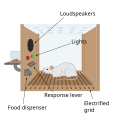Classical conditioning (also respondent conditioning and Pavlovian conditioning) is a behavioral procedure in which a biologically potent stimulus (e...
66 KB (8,709 words) - 03:33, 24 September 2024
Operant conditioning, also called instrumental conditioning, is a learning process where voluntary behaviors are modified by association with the addition...
67 KB (8,835 words) - 10:55, 10 September 2024
Eyeblink conditioning, classical conditioning involving pairing of a stimulus with an eyeblink-eliciting stimulus Fear conditioning, classical conditioning involving...
2 KB (320 words) - 14:46, 18 July 2024
can be used to study both operant conditioning and classical conditioning. Skinner created the operant conditioning chamber as a variation of the puzzle...
16 KB (1,804 words) - 07:00, 30 August 2024
Ivan Pavlov (section Classical conditioning)
experimental neurologist and physiologist known for his discovery of classical conditioning through his experiments with dogs. Pavlov was born the first of...
36 KB (4,044 words) - 16:50, 25 September 2024
Bedwetting alarm (section Classical conditioning)
This suggests that the conditioning treatment may follow the operant avoidance conditioning rather than the classical conditioning pattern. In addition...
12 KB (1,718 words) - 00:07, 14 July 2024
associations is the basis for learning. This learning is seen in classical and operant conditioning.[citation needed] Edward Thorndike did research in this area...
18 KB (2,446 words) - 22:10, 23 May 2024
study that mid-20th century psychologists interpret as evidence of classical conditioning in humans. The study is also claimed to be an example of stimulus...
24 KB (2,919 words) - 15:45, 21 September 2024
term conditioned emotional response (CER) can refer to a specific learned behavior or a procedure commonly used in classical or Pavlovian conditioning research...
6 KB (901 words) - 22:47, 16 March 2023
In classical conditioning, second-order conditioning or higher-order conditioning is a form of learning in which a stimulus is first made meaningful or...
5 KB (668 words) - 16:20, 16 April 2023




